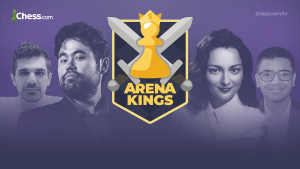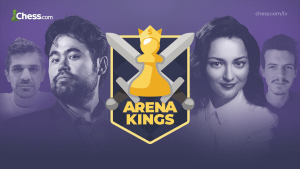
Master Path Study Plan: Bringing It All Together
Target Skill Range: Advanced Path (Rated 2000-2199)
Tasks:
- Analyze all games with a computer.
- Compete on the leaderboard.
- Start a blog.
- Play solitaire chess.
- Compete in a major open.
Congratulations! You've made it to the very end of the lesson plans! Your certificate is in the mail ![]()
If you have completed all of these lessons, you should be a very strong player by now. These final study plans are very forward thinking. Improvement from here is not easy; to be fair, improvement is never easy!
More than ever, you are responsible for your own improvement. You must challenge yourself to play against the very best competition in standard time control games, seriously study your own play and identify your weaknesses, Drill exercises that target these weaknesses. (The study plans have tons of ideas!)
At this level, it's not uncommon to devote yourself to addressing a single weakness in your game.
1. Analyze all serious games with a computer.
Reviewing your games is obviously incredibly important to improvement, and Chess.com gives you the best online tools to analyze your games.
After every serious game you play (online or offline), you should review the game with Chess.com's computer engine and opening database. The Chess.com analysis board is a great tool for the job! Whenever you review a game, do these things.
- Before you turn on a computer, go through the game and add your thoughts from the game. Include as much explanation as possible.
- Run an automated analysis of the game with Chess.com's computer analysis (again available in the analysis board). Use the resulting graph to instantly spot key moments.
- How was your time usage? Did you have enough time at the critical moments? Did you use the time when needed?
- Identify the point when you left your opening knowledge. At what point, did you no longer know the theory? Did you play the best move? If not, what was better and why was it better?
- Did you successfully convert/defend the endgame? If there are theoretical positions or ideas that you did not from the endgame, review those positions with computer workouts.
- Write down your three most important takeaways from the games.
2. Compete on the leaderboard.
The Chess.com leaderboard allows you to track your progress against your friends, your peers, and the elite players on the site. Take a look at your place and set a goal for improvement.
The right goals are different for everyone. They should be achievable, but require work. It might be reasonable for you to target a new rating class (breaking 2000), besting a friend's live rating, or being in the top 1% of user's on our site. Whatever it is, make sure that it is a goal that is meaningful for you.
Once you achieve your goal, set a new one! Keep moving forward!
3. Start a blog.
Chess.com has the biggest and (dare we say) best chess-blogging platform available. Everything is ready to go for you. All you need to do is create something.
Writing a blog is a great way for you to share moments that you found interesting in your own play, to connect with other friends and users, and to get feedback. Some players may be able to spot errors in your analysis or evaluations that your don't recognize. It's not uncommon for a GM or IM to drop into the comments and share some interesting perspectives.
One of the most educational things about writing a blog is that it forces you to explain your ideas. Often that writing process helps the ideas and positions you are discussing really "sink in."
You can blog about anything, but a great place to start is your own games. After playing a big tournament (Task #5), write about it and analyze all the games you played as deeply as possible. Here are some examples from our users!
4. Play 25 games of solitaire chess.
Ask a GM how to improve and one answer you are sure to get is "study classic games."
A great way to do that is with "Solitaire Chess." Find some great classic games and play through them, hiding the moves and attempting to determine the next move selected by the victor. See what percentage of the moves you can get right.
One of the best things about Solitaire Chess is that it builds a habit of thinking about what you would play in a game. Many players reviewing games passively play through the moves, thinking little about how they would play and what tactics and threats are present.
You can do this with any worthwhile game, but here is a video series from GM Gregory Kaidanov demonstrating the idea.
- Solitaire Chess: When Postponing Castling is Okay!
- Solitaire Chess - Part 1: Shirov's Play!
- Solitaire Chess - Part 2: Positional vs Attack, 1!
- Solitaire Chess - Part 3: Positional vs Attack, 2!
- Solitaire Chess - Part 4: Improving a Bad Position
A similar game to Solitaire Chess is the "Play Like" series of lessons. Pick your favorite player and try to find the moves from some of their best games!
5. Compete in a major open.
Congratulations! You have completed the Master Path Study Plan! It is now time to take your game on the road. Go to the website for your national federation and find a major open to attend. If you're lucky, your new skills will allow you to cash in with a prize ![]() More likely, your first tournament will be a bit rough, but you'll get to meet some of the most talented tournament players in the region. You will also meet many GMs and IMs and have the opportunity to experience chess played on a high level.
More likely, your first tournament will be a bit rough, but you'll get to meet some of the most talented tournament players in the region. You will also meet many GMs and IMs and have the opportunity to experience chess played on a high level.
If possible, analyze the games afterwards with your opponent. In person post-mortems are an incredibly valuable learning tool!






